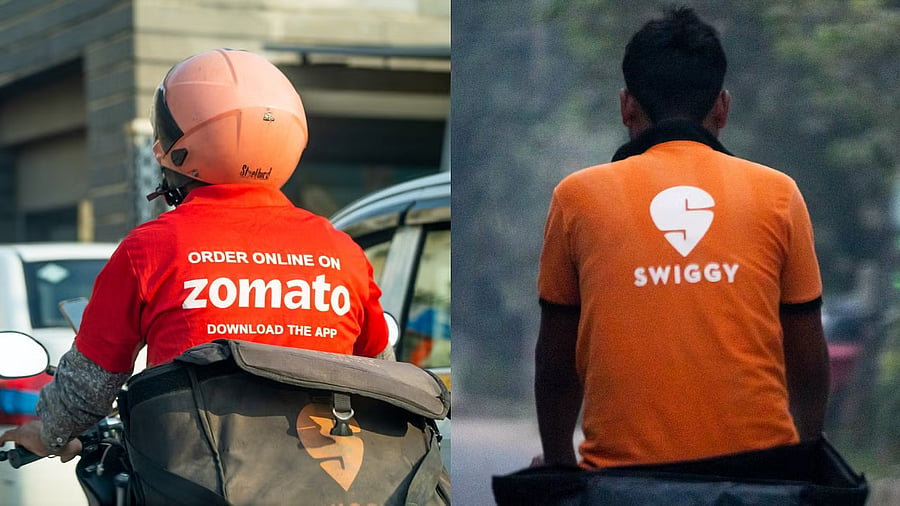
Zomato and Swiggy delivery partners seen in this collage.
Credit: iStock Photos
Bengaluru: Regulatory challenges will be an overhang for the quick commerce companies alongside intense competition likely impacting profitability and a decline in discretionary spends, according to a report by Anand Rathi Research out on Monday.
According to the report, Swiggy will not be able to keep up with Zomato across the rapid delivery segments, but its execution is expected to improve, boosted by growth and higher profitability.
Online food delivery company Zomato reported a 389% year-on-year rise in its consolidated net profit for the second quarter, ended September 2024, at Rs 176 crore. On the other hand, its peer Swiggy reported a consolidated net loss of Rs 625.5 crore, compared to a loss of Rs 657 crore in the corresponding period last year.
While Zomato became profitable in the first quarter of 2023-24, Swiggy remains a loss making company. However, both have doubled down on diversification beyond food delivery, although deploying different strategies. Zomato has followed an acquisition-led strategy with separate apps for various services, while Swiggy has an organic and an integrated app approach.
However, the research firm is of the view that in food delivery, the duopoly of Swiggy and Zomato is well entrenched and cannot be shaken easily. In 2020, Swiggy was the market leader, holding close to 52 per cent market share. However, it gradually ceded ground to Zomato, due to the latter’s relentless promotion of Gold membership.
On the other hand, in quick commerce multiple players are likely to co-exist.
“We believe consumers are indifferent to platforms and are only concerned with price, assortment and delivery time,” the report added. This has resulted in three to four times more monthly transacting users (MTUs) in quick commerce than those of slotted delivery platforms like Big Basket, DMart Ready.
Going ahead, the average order value (AOV) is expected to increase as stock keeping units (SKUs) are added with a gradual shift in the product mix from grocery to non-grocery.
Despite being the first mover with the launch of Instacafe in 2023 and launched Swiggy Café on 14th September, 2024, it is about four-five quarters behind Blinkit. As of Q2FY25, Blinkit operates in 45-50 cities with 791 dark stores, catering to 8.9 million monthly transacting customers (MTCs). In the same period, Instamart operated in 54 cities via a network of 609 dark stores, catering to 6.2 million MTCs.
The study emphasises on a possible customer shift that could happen in due to availability of products (assortments at dark stores), free wallet cash/discounts and delivery time.
While the report fails to elaborate on the regulatory challenges, it has been reported that food delivery platforms Zomato and Swiggy are already under investigation by Competition Commission of India (CCI) for favouring select restaurants listed on their platforms in exchange for guaranteed growth and lower commissions.
The anti-trust body is also looking into a complaint against quick commerce firms alleging that they indulged in predatory pricing and other anti-competitive practices. Even Amazon and Flipkart are under probe for allegedly indulging in exclusive arrangements, deep discounts and preferential listings in violation of competition law.